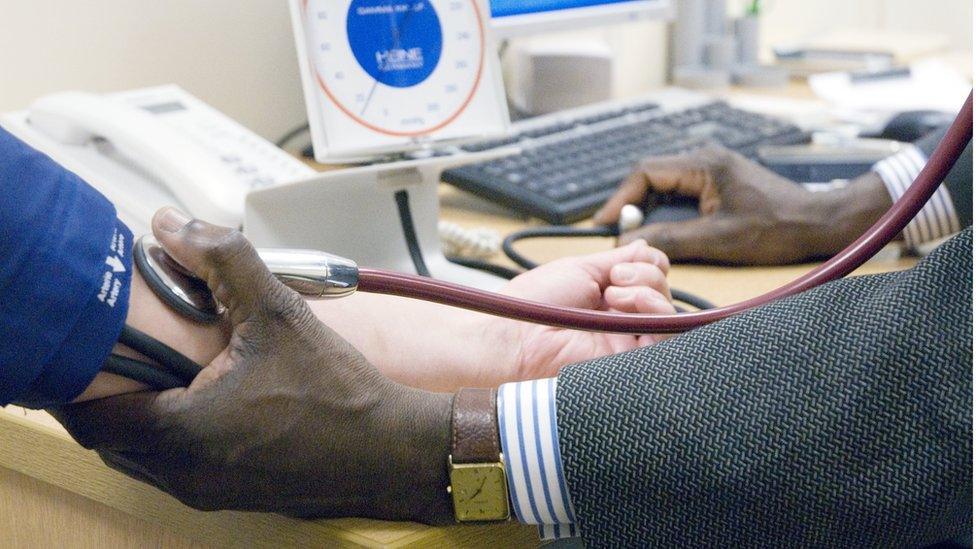NHS weekend: The UK picture
- Published

How is the concept of seven-day routine services across the NHS being discussed around the UK?
In England, the health secretary Jeremy Hunt has said he wants the NHS to offer a seven-day service. That means GP surgeries opening at weekends and more hospital services available as well.
While the debate heats up in England, our correspondents describe what is happening on the ground in Scotland, Wales and Northern Ireland.
Eleanor Bradford, BBC Scotland health correspondent:
The Scottish Government announced it was going to increase the number of consultants on duty out-of-hours two years ago. It was a plan supported by senior doctors and medical colleges.
There have been some pilot schemes but no widespread evidence that the number of consultants has increased - in fact vacancy rates have just gone up.
An interesting study was published from data at Dumfries and Galloway Royal Infirmary in 2013. It found that even after more consultants were put on shift out-of-hours, there were still higher death rates on bank holidays.
The authors said it could be that people wait until their symptoms are more severe before coming to a hospital on a bank holiday or that although there were more doctors, there still weren't enough supporting staff.
The staffing of hospitals during the evenings, weekends and holidays is currently under review. A taskforce is looking at every part of the way a hospital works - whether patients can get MRI and CT scans, whether they can be discharged quickly (so that new patients can be admitted) and even whether they should be there at all.
Surveys conducted in Scotland and elsewhere indicate that around a quarter of patients in emergency beds in the morning no longer need that kind of care.
Meanwhile the UK's biggest critical care complex has just opened in Glasgow. The 1,100 bed, 14-storey "super-hospital" was designed to make seven-day working easier by merging staff in several hospitals on to one big rota.
So far, though, the hospital has been plagued by problems - not least the fact that the staff can't find anywhere to park.

Hywel Griffith, BBC Wales correspondent:
According to the BMA, Welsh hospitals struggle to offer a full five-day service, so the prospect of being open all hours, seven days a week remains very distant.
Instead, the mood music here is all about consolidation and prioritisation. That means making sure emergency units and critical care centres are fully staffed to deal with the most urgent cases, 365 days a year.
There are moves to introduce more weekend access to diagnostic tests, pharmacies and therapies - helping to discharge patients earlier and ease the bottlenecks that have built up on medical wards.
But don't expect the doors to open wide for elective treatment on Saturdays and Sundays.
Part of the problem is the very real shortage of doctors in Wales - at the start of 2015 there were 400 unfilled training places.
Rural health boards in particular struggle to recruit specialist staff. There's also a problem on the horizon with Welsh GPs because nearly a quarter are expected to retire in the next five years.
This landscape helps explain why the Welsh Government isn't pushing for the same sort of changes as in England - and it could well argue that there isn't the same public appetite.
According to the government's own annual survey, a staggering 96% of patients are satisfied with their overall experience of the Welsh NHS.
That doesn't offer much impetus for attempting difficult, fundamental changes in order to create a seven-day service.

NHS weekend: Want to know more?
Visit the BBC's special report page on 7-day services (This link will not work on the BBC app but some of the key content can be seen below)
Nick Triggle: Does a Monday to Friday culture exist in hospitals?


Marie-Louise Connolly, BBC Northern Ireland health correspondent:
A report produced by the BMA in February 2015 said there needed to be 46 more GPs trained per year in Northern Ireland in order to meet gaps in the workforce.
So dire is the situation across the region, that in July the BMA described things as being at "crisis point".
Six surgeries are at high risk of collapse this year, with a further 20 expected to close next year, and most practices are reporting waiting lists of up to several weeks.
According to GPs, part of the problem is that the workforce is simply too lean. It's also made up of an older generation of doctors who see predominately older patients with chronic health problems.
While the BMA says funding has been focused too much on hospitals, and that needs to be reversed, health officials argue that practices need to be run differently, offering evening and weekend appointments.
GPs in Northern Ireland say there is a need for radical change - and strong leadership - even if it doesn't win votes.
The seven-day working debate triggered by Jeremy Hunt really struck a chord.
Hospital consultants and union representatives all hit back arguing that a majority of services are available at weekends, albeit reduced compared to weekdays.
Many consultants I spoke to said that without the support of X-rays, pharmacies and even social care services in the community, their efforts to tackle caseloads at the weekend are futile. They were also insulted at the assertion that they avoided weekend work.
Northern Ireland already spends millions per year using locums to fill the rota and unions argue this money would be better invested in long-term workforce planning.
Simon Hamilton, Northern Ireland's Health Minister, says he backs the Secretary of State's call for seven-day working.
Meanwhile, all the health unions are calling for greater investment in staffing, reconfiguration of hospitals and buildings and more focus on workforce planning.
As it all comes down to resources, there's little optimism this will happen any time soon.
- Published6 September 2015

- Published16 July 2015

- Published13 August 2015
- Published7 August 2015